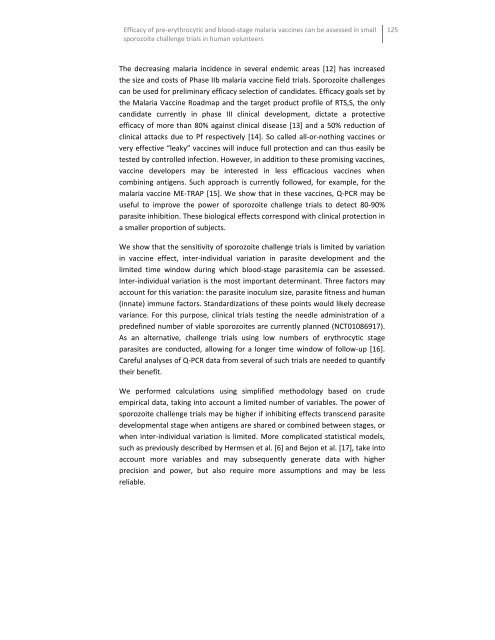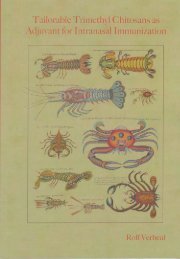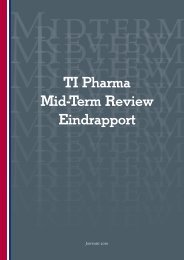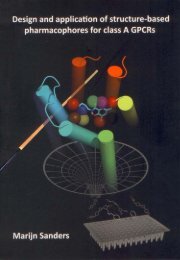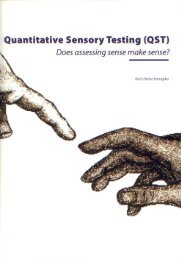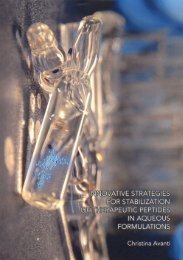Experimental infection and protection against ... - TI Pharma
Experimental infection and protection against ... - TI Pharma
Experimental infection and protection against ... - TI Pharma
Create successful ePaper yourself
Turn your PDF publications into a flip-book with our unique Google optimized e-Paper software.
Efficacy of pre-erythrocytic <strong>and</strong> blood-stage malaria vaccines can be assessed in small<br />
sporozoite challenge trials in human volunteers<br />
The decreasing malaria incidence in several endemic areas [12] has increased<br />
the size <strong>and</strong> costs of Phase IIb malaria vaccine field trials. Sporozoite challenges<br />
can be used for preliminary efficacy selection of c<strong>and</strong>idates. Efficacy goals set by<br />
the Malaria Vaccine Roadmap <strong>and</strong> the target product profile of RTS,S, the only<br />
c<strong>and</strong>idate currently in phase III clinical development, dictate a protective<br />
efficacy of more than 80% <strong>against</strong> clinical disease [13] <strong>and</strong> a 50% reduction of<br />
clinical attacks due to Pf respectively [14]. So called all-or-nothing vaccines or<br />
very effective “leaky” vaccines will induce full <strong>protection</strong> <strong>and</strong> can thus easily be<br />
tested by controlled <strong>infection</strong>. However, in addition to these promising vaccines,<br />
vaccine developers may be interested in less efficacious vaccines when<br />
combining antigens. Such approach is currently followed, for example, for the<br />
malaria vaccine ME-TRAP [15]. We show that in these vaccines, Q-PCR may be<br />
useful to improve the power of sporozoite challenge trials to detect 80-90%<br />
parasite inhibition. These biological effects correspond with clinical <strong>protection</strong> in<br />
a smaller proportion of subjects.<br />
We show that the sensitivity of sporozoite challenge trials is limited by variation<br />
in vaccine effect, inter-individual variation in parasite development <strong>and</strong> the<br />
limited time window during which blood-stage parasitemia can be assessed.<br />
Inter-individual variation is the most important determinant. Three factors may<br />
account for this variation: the parasite inoculum size, parasite fitness <strong>and</strong> human<br />
(innate) immune factors. St<strong>and</strong>ardizations of these points would likely decrease<br />
variance. For this purpose, clinical trials testing the needle administration of a<br />
predefined number of viable sporozoites are currently planned (NCT01086917).<br />
As an alternative, challenge trials using low numbers of erythrocytic stage<br />
parasites are conducted, allowing for a longer time window of follow-up [16].<br />
Careful analyses of Q-PCR data from several of such trials are needed to quantify<br />
their benefit.<br />
We performed calculations using simplified methodology based on crude<br />
empirical data, taking into account a limited number of variables. The power of<br />
sporozoite challenge trials may be higher if inhibiting effects transcend parasite<br />
developmental stage when antigens are shared or combined between stages, or<br />
when inter-individual variation is limited. More complicated statistical models,<br />
such as previously described by Hermsen et al. [6] <strong>and</strong> Bejon et al. [17], take into<br />
account more variables <strong>and</strong> may subsequently generate data with higher<br />
precision <strong>and</strong> power, but also require more assumptions <strong>and</strong> may be less<br />
reliable.<br />
125


